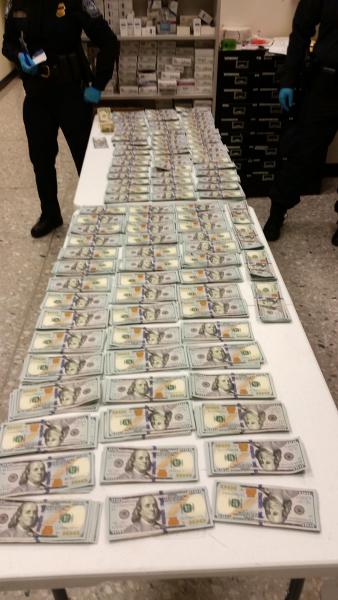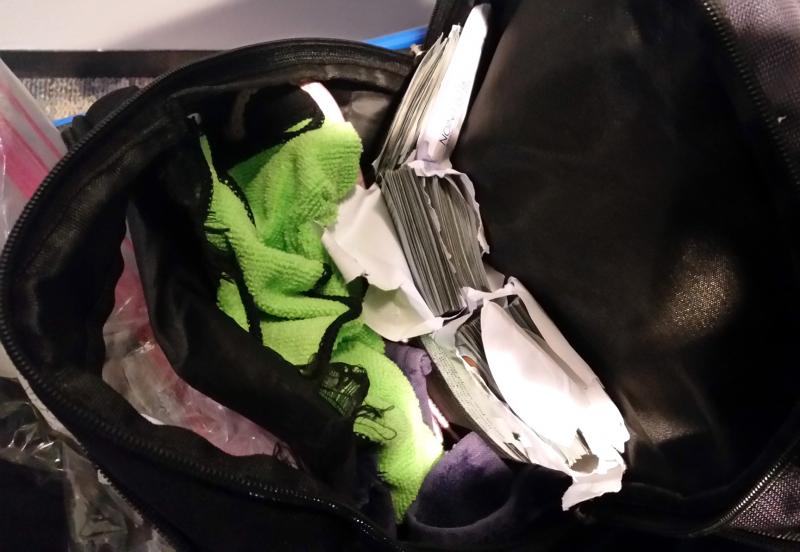A CBP Currency Detector Dog Alert Led to One Seizure
STERLING, Va., — U.S. Customs and Border Protection (CBP) officers seized more than $143,968 in unreported currency from two men who departed for Ghana and one who arrived from Ghana in three separate incidents during the weekend at Washington Dulles International Airport.

in unreported currency from
three Ghanaian men at
Washington Dulles International
Airport January 13-14, 2018
CBP is not releasing the travelers’ names because none was criminally charged.
During outbound inspection operations Sunday, CBP officers seized $100,111 from a man destined to Accra, Ghana who initially claimed that he possessed $2,000. CBP officers discovered $10,000 in each of 10 bank envelopes in the man’s backpack.
Earlier Sunday, CBP officers seized $20,031 from a man who arrived from Ghana who initially reported that he possessed $10,000. During an inspection, CBP officers discovered an additional $10,000 wrapped in a t-shirt in the man’s carry-on bag, plus another $31 in loose pocket currency.
On Saturday, CBP officers seized $23,826 from a man bound for Ghana after a currency detector dog alerted to his carry-on bag. The man initially reported that he possessed $5,000. A baggage exam revealed $23,826 in a suit jacket and camera bag.
Travelers may carry as much currency as they wish into and out of the United States. Federal law requires that travelers must report all U.S. and foreign monetary instruments totaling $10,000 or greater on a U.S. Treasury Department financial form. None of the currency is taxed.
“Customs and Border Protection encourages travelers to be completely honest when reporting all their currency during an inspection with a CBP officer, or be prepared to face severe consequences,” said Daniel Mattina, CBP Area Port Director for the Area Port of Washington Dulles. “The best way for travelers to hold onto their currency is to fully comply with our nation’s currency reporting laws.”
Following each currency seizure, CBP officers provided a humanitarian monetary release of $1,111 to the man who departed the U.S. on Sunday, $826 to the man who departed on Saturday, and $831 to the man who arrived to the U.S. on Sunday. CBP released all three men to continue to travel.
“CBP officers not only ensure that inbound travelers and cargo comply with U.S. laws and regulations, but they also conduct outbound examinations to safeguard the revenue of the U.S. These inspections protect against unreported exportations of bulk U.S. currency, which often can be proceeds from alleged illicit activity,” said Casey Owen Durst, Director, CBP’s Field Operations Director in Baltimore “These significant currency seizures are a direct reflection of our continuing commitment to enforcing federal currency reporting requirements.”

unreported cash in one traveler's baggage.
Travelers are encouraged to visit CBP’s Travel section to learn more about the CBP admissions process and rules governing travel to and from the U.S.
CBP’s Office of Field Operations
Almost a million times each day, CBP officers welcome international travelers into the U.S. In screening both foreign visitors and returning U.S. citizens, CBP uses a variety of techniques to intercept narcotics, unreported currency, weapons, prohibited agriculture, and other illicit products, and to assure that global tourism remains safe and strong.
On a typical day, CBP seizes $289,609 in undeclared or illicit currency along our nation’s borders. Learn more about what CBP did during "A Typical Day" in 2016.
CBP's border security mission is led at ports of entry by CBP officers from the Office of Field Operations. Please visit CBP Ports of Entry to learn more about how CBP’s Office of Field Operations secures our nation’s borders.
Learn more about CBP at CBP.gov.

